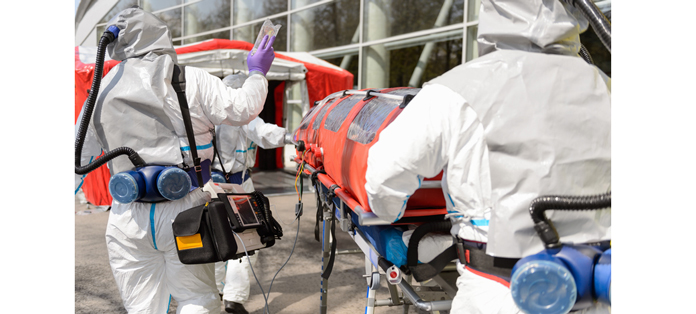As if RNs working in hospital jobs aren’t stressed enough – along comes Ebola. For the record, I am not panicking about an Ebola epidemic (yet). The official death toll from Ebola at the date of this blog is just under 4,000 people – this is in some of the poorest and most densely populated countries in the world.
No Ebola deaths have been reported here in the United States. But, as many as 48,000 people die from flu each year. And more shockingly, 400,000 die each year from medical malpractice in hospitals. Living in one of the richest countries in the world, these 400,000 deaths from medical malpractice is what I classify as an epidemic of ridiculous proportion.
When it comes to Ebola, nursing, medical and hospital malpractice is really what we should be concerning ourselves with. The first patient to be diagnosed with Ebola here in the States suffered a glaring incident of medical malpractice that was initially blamed on a flaw in the EHR which kept the doctors from reading the complete medical record – something Certified Legal Nurse Consultants certainly know to do.
It’s undisputed that the ED nurse obtained the patient’s travel history which was a strong indication of Ebola and entered it into the medical record where it should have been available to the healthcare providers. All Certified Legal Nurse Consultants know that a patient’s history is 95% of the diagnosis, especially in a case like this. So who dropped the ball? My guess is the ED physicians didn’t read the documented history. It’s also arguable that the nurse should have shouted the patient’s history to the ED physicians. Nurses know that doctors are notorious for not reading a patient’s medical record.
The hospital has since stopped blaming the EHR, but has stopped short of blaming its medical team, according to the New York Times. It will be interesting to see if the people who were exposed after the patient was released from the hospital contract Ebola and then proceed to pursue a claim against the facility for negligently releasing the patient.
According to a Reuters news report, U.S. nurses say they are unprepared to handle Ebola patients. This is not surprising since the hospitals themselves seem unprepared. This unpreparedness of both the nurses and hospitals will increase the direct corporate liability of hospitals in Ebola medical malpractice cases.
Healthcare in the U.S. is far superior to healthcare in the African countries suffering the outbreak and we currently don’t have anything close to an Ebola epidemic. There should be no need to panic when an Ebola patient presents. UNLESS, of course, health care providers and hospitals continue the tradition of malpracticing on patients as they are prone to do.
I’m Just Sayin’
P.S. Comment and share your opinions about Ebola.









As an ER nurse, my first thought was,”Aren’t they tracking where people have been lately? That’s public health 101. Not rocket science.” Glad the nurse was doing her charting properly, however, did she not speak to the physician? I would have told the doctor up front he had been to a suspicious area. Reminds me of a case I had of something we were watching for from New York a few years ago. When I asked the questions about recent travel, and they had the symptoms, I was immediately talking to my physician. And sure enough, they had it. Nurses need to speak up. Not just take it for granted that the doctor knows something that was charted.
Today the news reported a nurse contracted the virus. I am sure we will find out later what happened in that scenario. I hope they do. We do not want nurses walking off the job.
I have noticed since we came into the electronic age, communication between physicians and nurses went down the drain. As medical providers we have our heads in the computers and not on patient-focused care anymore. Nurses have to go around this system and directly speak to the physicians to get what the patient needs. The electronic health record as I was told, was to save us time. Now, we have to take more time to save lives.
I was in the hospital just recently and was SHOCKED that NO ONE took my medical history; not the nurses or the doctors.
I am an outspoken ED nurse. Believe me I advocated for myself the entire time. But what if I was not an experienced ED nurse but a scared person with no medical knowledge? Patients put their blind trust into the staff they seek care from.
Of course, I also wonder if the patient in question did not already know he had Ebola. He gained entry to the US illegally by lying on his travel documents.
This would be an interesting case to investigate. This individual knew he had been exposed to Ebola and lied to the airline. This was the first breech. He met case definition when he presented to the hospital days later. He gave a positive travel history to West Africa and was symptomatic, but failed to reveal he had been exposed to Ebola. Not only did the facility drop the ball, but the patient did too!
Vickie, you read my mind and validated my thoughts about this deadly outbreak scenario. Now is the time for we CLNC® consultants to plan our strategy in this matter, hone in on our skills starting with the statistics as you have showcased in this blog, learn the disease which is what we RNs are great at and be ready for a potential tsunami. This is one time I hope we are overreacting.
As always, thank you.
Wow, Vickie, valid points I never considered.
Thanks.
If the hospital really did send the guy home with a 103 fever, that’s an issue right there.
The postings have been right on… I work in a small rural ED that does not have EMR!! As a result, we communicate the old fashioned way… the triage nurse takes a history, then gives a verbal report to the ED physician. That eliminates the Dr. from having to actually read the chart prior to assessing the pt., IF the triage nurse gives an accurate and complete verbal report. The physician is still responsible for what is in the chart. That being said, I believe that precautions should be started BEFORE the patient enters the ED area, much like the flu precautions. A sign posted at the door asking if they have traveled outside the US to Africa, or been exposed to someone that has should preclude them to donning a mask before entering a busy ED waiting room and exposing other patients as well as staff. That’s just the tip of the iceberg, and basic infection prevention precautions!
Interesting Carol, enjoy hard copies as long as you can and the close contact with MDs. I live in a low population state and we have a slim chance of contracting Ebola. In a larger city nearby, a trauma hospital is initiating ER staff to meet vehicles in the driveway before anyone gets out of the car and ask Ebola type questions. If there is a “yes” answer, they move the vehicle to the ambulance barn where Ebola equipment is located to suit up first, then deal with the patient. We will see how well this goes.